
The gold price ended September at about US$1,848 per ounce, and it sank even lower this past week — the yellow metal fell to the US$1,815 level midway through the period, although it finished just above US$1,830.
What exactly is going on with gold? Many market watchers believe its troubles relate back to the US Federal Reserve’s higher-for-longer interest rate strategy. At the central bank’s last meeting, officials indicated that one more hike is likely in 2023, with two cuts on deck for 2024 — if that holds true, there won’t be much movement in the next year.
With rates looking set to stay high for the foreseeable future, American bond yields are taking off, and that’s been lending strength to the US dollar. This week 10 year Treasury yields hit a 16 year high, while 30 year Treasury yields pushed above 5 percent for the first time since 2007. A hotter-than-expected US jobs report on Friday (October 6) provided a further boost.
Together this news hasn’t been positive for gold. While the experts I’ve been speaking with remain positive on the precious metal in the long term, the broad consensus is that the price is likely to be kept under wraps until the Fed starts to lower rates.
Some are embracing these circumstances as a buying opportunity. For example, Costco (NASDAQ:COST) has now started selling 1 ounce gold bars, and they’re reportedly flying off the shelves. But it’s also causing major fatigue among investors as not everyone is interested in hanging on as times get tougher. We’re interested to know where you stand — leave us a comment below to let us know if you’re taking a step back from gold or adding to your position in the sector.
Positive uranium catalysts continue piling up
Last week’s update covered a number of recent uranium industry developments, but the news keeps coming — since that time, major producer Kazatomprom (LSE:59OT,OTC Pink:NATKY) has announced plans to end its production cuts in 2025.
If you’ve been following the uranium market, you’ll know that as demand continues to grow supply is becoming a larger and larger question mark. With that in mind, I asked Adam Rozencwajg of Goehring & Rozencwajg what impact Kazatomprom’s news could have on the sector. Here’s how he explained it:
I don’t know that this is written in stone just yet. They’re the largest uranium producer in the world, and so bringing on an additional 10,000 tonnes per year of uranium impacts the supply and demand balance, but actually the deficits are so severe going forward over the next seven or eight years that it definitely does not swing this market into a surplus’ — Adam Rozencwajg of Goehring & Rozencwajg
Rozencwajg and his firm are very positive on the outlook for uranium, and I recommend watching the full interview if you’d like to hear more of his views on supply, demand and pricing.
Securities Disclosure: I, Charlotte McLeod, hold no direct investment interest in any company mentioned in this article.


Comments are closed.